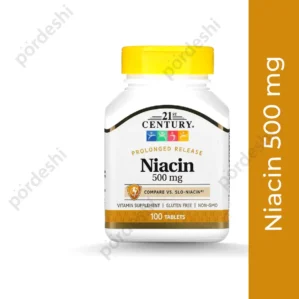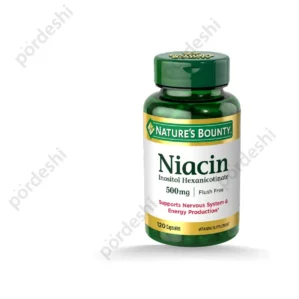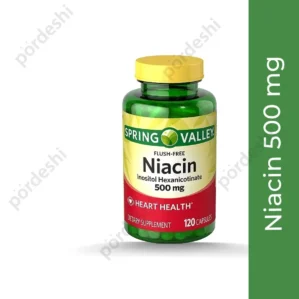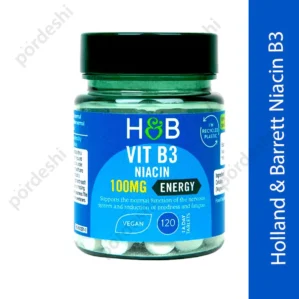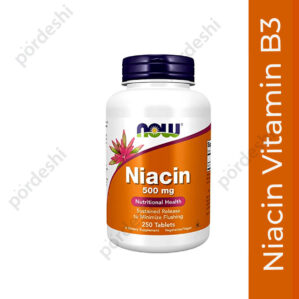Niacin
Showing all 6 resultsSorted by latest
21sCentury Niacin
Original price was: 3,150.00৳.2,849.00৳Current price is: 2,849.00৳.Puritan’s Pride Niacin
Original price was: 3,150.00৳.2,849.00৳Current price is: 2,849.00৳.Nature’s Bounty Niacin
Original price was: 3,150.00৳.2,849.00৳Current price is: 2,849.00৳.Spring Valley Niacin 500mg
Original price was: 3,150.00৳.2,849.00৳Current price is: 2,849.00৳.Now Niacin 500mg
Original price was: 2,600.00৳.2,450.00৳Current price is: 2,450.00৳.The Ultimate Guide to Niacin: Benefits, Sources, and Top Brands in Bangladesh
It is known as nicotinic acid, is a vital nutrient that plays an essential role in maintaining overall health. As a vitamer of vitamin B3, It is necessary for various bodily functions, including energy production, DNA repair, and cell signaling. For those who are conscious about their health and nutrition, understanding the importance of niacin and how to incorporate it into your diet is crucial. This guide aims to provide a comprehensive overview, its benefits, sources, types, and tips for choosing the best niacin supplements available in Bangladesh.
What is Niacin?
It (nicotinic acid) is an organic compound and a form of vitamin B3. It is an essential human nutrient produced by plants and animals from the amino acid tryptophan. It can be obtained through a variety of whole and processed foods, particularly those that are fortified. Common dietary sources include meat, poultry, red fish such as tuna and salmon, nuts, legumes, and seeds.
It is widely used as a dietary supplement to treat pellagra, a disease caused by niacin deficiency. Symptoms of pellagra include skin and mouth lesions, anemia, headaches, and tiredness. Many countries have mandated the addition of niacin to wheat flour or other food grains to reduce the risk of pellagra.
Why is Important?
It is crucial for several reasons:
- Energy Production: It is involved in converting carbohydrates into glucose, which the body uses for energy.
- DNA Repair: It plays a role in the repair of DNA and the synthesis of new cells.
- Cell Signaling: It is necessary for proper cell signaling and communication within the body.
- Cholesterol Management: It helps in managing cholesterol levels by lowering bad cholesterol (LDL) and increasing good cholesterol (HDL).
- Skin Health: It contributes to healthy skin by repairing damaged cells and reducing inflammation.
Who Needs?
It is essential for everyone, but certain groups may need to pay extra attention to their niacin intake:
- Individuals with Poor Diets: Those who consume a diet low in niacin-rich foods may need to supplement.
- People with Specific Health Conditions: Conditions such as pellagra, hyperlipidemia, and certain metabolic disorders may require increased niacin intake.
- Older Adults: Aging can affect nutrient absorption, making it important for older adults to ensure adequate niacin intake.
- Athletes: High physical activity levels can increase the body’s demand.
Natural Sources
It is found in a variety of foods, both whole and processed. Here are some of the richest sources:
- Animal-Based Foods: Meat, poultry, and fish are excellent sources, providing about 5–10 mg of niacin per serving.
- Plant-Based Foods: Nuts, legumes, and grains offer 2–5 mg per serving. However, the bioavailability of niacin in some grains is limited.
- Fortified Foods: Many packaged foods, such as cereals and flours, are fortified with niacin to ensure adequate intake.
Types of Niacin Supplements
It comes in various forms:
- Immediate-Release Niacin: Quickly absorbed and used by the body.
- Extended-Release Niacin: Slowly released into the bloodstream, reducing the risk of side effects.
- Niacinamide (Nicotinamide): A form of niacin that does not cause flushing, making it suitable for those sensitive to this side effect.
Benefits of Using
Supplementing with It can offer several health benefits:
- Cholesterol Management: Helps lower LDL cholesterol and triglycerides while raising HDL cholesterol.
- Heart Health: Reduces the risk of heart attack and atherosclerosis.
- Improved Brain Function: Supports cognitive function and may help prevent neurodegenerative diseases.
- Skin Health: Reduces the risk of skin conditions such as acne and inflammation.
- Energy Boost: Enhances energy levels by aiding in the conversion of food into energy.
Risks and Side Effects
While it is generally safe, it can cause side effects, especially at high doses:
- Flushing: Reddening and warming of the face and neck.
- Digestive Issues: Diarrhea, nausea, and vomiting.
- Muscle Problems: Unexplained muscle weakness, tenderness, or pain.
- Liver Issues: Abnormal liver function tests and potential liver damage at high doses.
How to Choose the Best One.
When choosing it, consider the following factors:
- Form: Decide between immediate-release, extended-release, or niacinamide based on your tolerance and needs.
- Dosage: Follow recommended dosages and consult a healthcare provider if unsure.
- Quality: Opt for reputable brands that use high-quality ingredients and have good manufacturing practices.
How We Chose the Best Niacin Supplements
We selected the best supplements based on:
- Ingredient Quality: High-quality, bioavailable forms.
- Brand Reputation: Trusted brands with positive customer reviews.
- Effectiveness: Proven effectiveness in managing cholesterol and improving overall health.
- Safety: Minimal side effects and adherence to safety standards.
Ingredients: What to Pay Attention To
- Purity: Ensure the product is free from unnecessary additives and fillers.
- Bioavailability: Choose forms that are easily absorbed by the body.
- Third-Party Testing: Products tested by independent labs for quality and potency.
Tips for Taking
- Start Low, Go Slow: Begin with a lower dose and gradually increase to minimize side effects.
- Take with Food: Consuming it with meals can reduce flushing and digestive issues.
- Stay Hydrated: Drink plenty of water to help flush out excess one.
What Is the Difference Between Kids’, Men’s, and Women’s Multivitamins?
- Kids’ Multivitamins: Typically have lower doses of vitamins and minerals to suit children’s needs.
- Men’s Multivitamins: Often include higher amounts of certain vitamins like B12 and minerals like zinc for energy and muscle function.
- Women’s Multivitamins: Usually contain higher levels of iron and folic acid to support reproductive health.
Top Niacin Brands:
H&B, Natures bounty, Now, Spring valley, Puritans pride, 21sCentury
Pordeshi Picks for the Best Niacin Supplements in Bangladesh
For those in Bangladesh, here are our top picks:
- NOW Niacin 500mg: Available through various online retailers.
- Holland & Barrett Vitamin B3 + Niacin: It Can be found in select stores and online.
- Spring Valley Niacin 500mg: Accessible through local pharmacies and online platforms.
- 21sCentury Niacin: Available in health stores and online.
- Nature’s Bounty Niacin: Widely distributed and easy to find online.
Conclusion
It is an essential nutrient with numerous health benefits, from managing cholesterol levels to supporting brain and skin health. Whether you obtain niacin through your diet or supplements, ensuring adequate intake is crucial for overall well-being. By understanding the different forms, benefits, and potential side effects, you can make informed decisions about incorporating niacin into your health regimen. For those in Bangladesh, there are several reputable brands available to meet your niacin needs.
20 Frequently Asked Questions About
- What is niacin?
It is a form of vitamin B3, essential for energy production, DNA repair, and cell signaling.
- Why do I need niacin?
IT supports overall health, including cholesterol management, brain function, and skin health.
- What are the natural sources of niacin?
Meat, fish, poultry, nuts, legumes, and fortified foods are rich sources.
- What are the different types of niacin supplements?
Immediate-release, extended-release, and niacinamide.
- What are the benefits of taking niacin supplements?
Improved cholesterol levels, heart health, brain function, and energy.
- Are there any risks of taking niacin supplements?
Possible side effects include flushing, digestive issues, muscle problems, and liver issues.
- How much niacin should I take daily?
Consult a healthcare provider for personalized dosage recommendations.
- Can I get enough niacin from my diet alone?
It’s possible, but supplements can help ensure adequate intake.
- What are the best niacin supplements available?
Brands like NOW, Holland & Barrett, Spring Valley, 21st Century, and Nature’s Bounty.
- Is niacin safe for everyone?
Generally safe, but consult a healthcare provider if you have specific health conditions.
- Can niacin help with weight loss?
Indirectly, by improving energy levels and metabolism.
- Does niacin interact with other medications?
Yes, especially with certain cholesterol drugs. Consult your doctor.
- Can I take niacin if I’m pregnant?
Consult your healthcare provider for advice.
- How do I know if I’m niacin deficient?
Symptoms include fatigue, skin issues, and digestive problems.
- What is the difference between niacin and niacinamide?
Niacinamide does not cause flushing and is often used for skin health.
- Can kids take niacin supplements?
Consult a pediatrician before giving supplements to children.
- Are there any foods fortified with niacin?
Yes, many cereals and flours are fortified.
- How soon can I expect to see benefits from taking niacin?
It varies, but some benefits may be noticeable within a few weeks.
- What should I look for in a niacin supplement?
Purity, bioavailability, and third-party testing.
- Can niacin improve mental health?
It supports brain function and may help with cognitive issues.
By understanding the importance of niacin and how to incorporate it into your diet or supplement routine, you can take a proactive approach to maintaining your health and well-being.
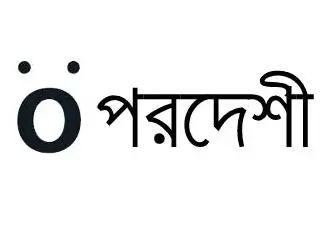


 Hair Care
Hair Care
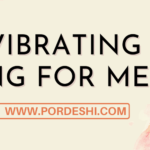 Vibrating Rings
Vibrating Rings
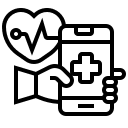
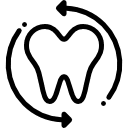 Oral Care
Oral Care
